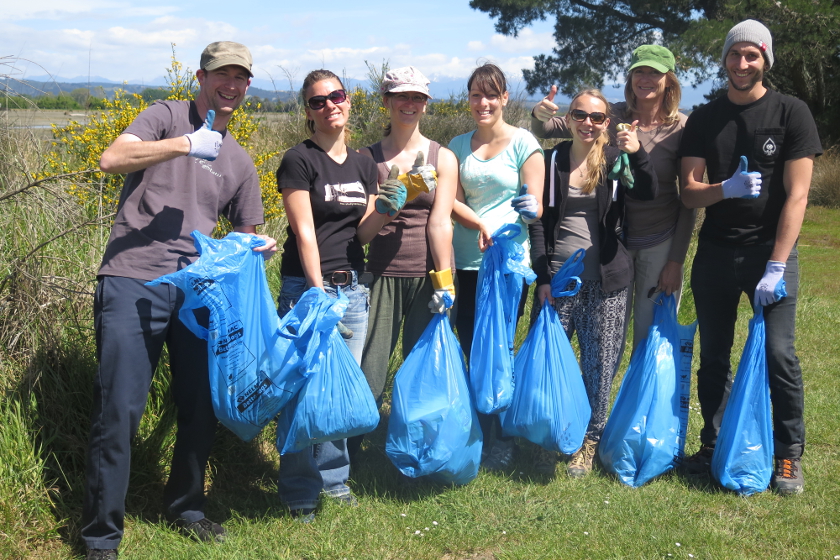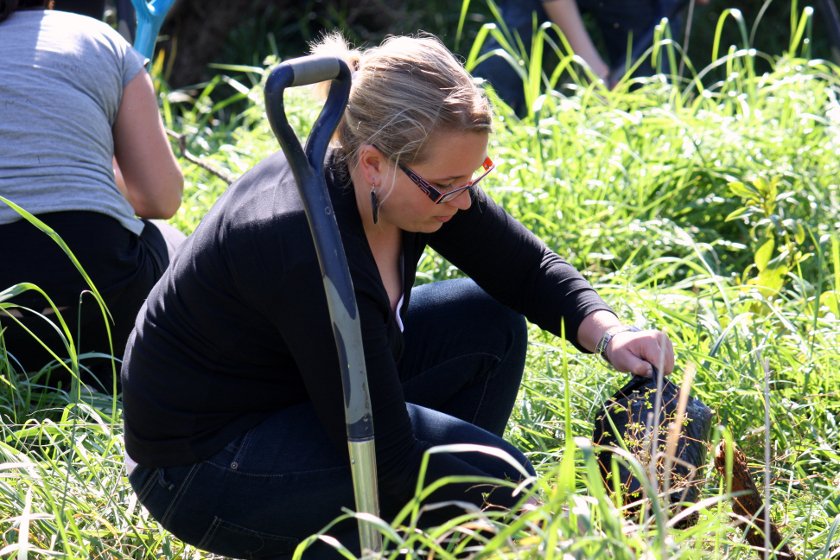Auszeit Neuseeland hat seinen Sitz in Neuseeland. Nicht zuletzt deshalb liegt uns das Wohlergehen der Menschen und der Schutz der Umwelt hier am Herzen. Wir möchten helfen! Mit unserem Auszeit Neuseeland We Care Programm unterstützen wir gemeinnützige Umwelt- und Sozialprojekte in Neuseeland wie z. B. für den Schutz von bedrohten Tierarten, die Unterstützung sozial benachteiligter Menschen, die Hilfe für Kinder- und Jugendeinrichtungen oder den Schutz und Erhalt der Maori-Kultur, damit Neuseeland so erlebnisreich und vielfältig bleibt!
WE CARE - Wir unterstützen Umwelt- und Sozialprojekte in Neuseeland!

Bisherige Auszeit Neuseeland We Care-Projekte (zusammen mit Study Nelson)
Brook Sanctuary Business Club:
Auszeit Neuseeland We Care ist Mitglied des Brook Waimarama Sanctuary Business Clubs zur Unterstützung des Naturschutzreservats vor den Toren Nelsons.
Beach-Clean-Up:
In Zusammenarbeit mit dem Department of Conservation, der neuseeländischen Naturschutzbehörde, reinigte das Study Nelson-Team einen Strand auf Best Island in der Nähe von Nelson.
Haiti Earthquake Sanson-Rejouis Family Fund:
Ein Netzwerk aus Freunden und Familien für die in Nelson lebende Emily Sanson-Rejouis und ihre jüngste Tochter Alyahna. Durch das schwere Erdbeben in Haiti im Januar 2010 hat Emily ihren Ehemann und ihre beiden ältesten Kinder Kofie-Jade (5) und Zenzie (3) verloren. Study Nelson We Care unterstützte den Fund mit NZD 1000.
KO AU Kapa Haka Gruppe:
Die Gruppe besteht aus 6-8 Mädchen zwischen 9 und 19 Jahren und führt den Haka, den traditionellen Tanz der Maori, auf. Die Gruppe aus Wellington ist bereits weltweit aufgetreten, möchte aber insbesondere die Jugend Neuseelands ermutigen, mehr über die eigene Kultur zu lernen und diese zu bewahren. Study Nelson We Care spendete dafür NZD 250.
Nelson Region Hospice – Sponsor for the Day:
Study Nelson We Care bezahlte einen kompletten Arbeitstag einer Hospizkrankenschwester am Nelson Region Hospice.
Tree-Planting:
Zweimal jährlich veranstaltete Study Nelson in Kooperation mit der Stadtverwaltung Nelsons ein Bäumepflanzen. Jeder Austauschschüler pflanzte dabei 2-3 einheimische Bäume und erhielt dafür ein Zertifikat. Das Pflanzen der Bäume soll die Erfahrungen der Schüler in Neuseeland und insbesondere ihre Verbundenheit zu Nelson symbolisieren.
KIVA:
Kiva ist eine gemeinnützige Organisation, die weltweit Geld an in Armut lebende Menschen verleiht, damit diese sich eine Existenz aufbauen können. Durch die Verbindung dieser Mikrofinanzierung mit dem Internet schafft Kiva eine globale Gemeinschaft zwischen Darlehensgebern und -nehmern. Study Nelson We Care ist dauerhafter Kiva-Darlehensgeber.
Light Nelson:
Light Nelson ist ein ganzjähriges Projekt, das jeden Winter in einem großen Event seinen Höhepunkt erreicht. Mit unzähligen Leucht-/ Lichtkunstwerken wird in Nelson dann das Talent, der Einfallsreichtum, die Großzügigkeit und Kunst der Stadt gefeiert. Study Nelson ist einer der Sponsoren von Light Nelson.

Eco-friendly Travel Guide
Please help keeping New Zealand beautiful!
We know you are excited about your time in New Zealand and we wish you an awesome experience. But please do never forget about NZ’s unique landscape, flora and fauna. We love it and you will love it too. So please get involved caring for the environment and protecting this beautiful country. Auszeit Neuseeland We Care has collected some useful tips on how to live and travel eco-friendly – so many more generations will be able to enjoy NZ’s beauty.
WATER
Water is the source of life and the habitat of many of NZ’s unique species. Plus it is a major resource and NZ often suffers from water shortage during the summer months. So please keep NZ’s lakes, rivers and seas free of rubbish and don’t waste NZ’s water supply.
- Clean your camping equipment at home to prevent the spread of pests like algae
- Use water sparingly (e.g. take short showers)
WASTE
Waste is harmful to our environment and can cause diseases – hence please:
- Do not litter, put your rubbish in provided bins or if hiking in a national park take all rubbish with you back home
- if you are flatting bring your paper, glass, plastic and cans to a recycling station
- reuse plastic bags and water bottles
- use only designated dump stations for camper vans (you can get a list from every i-SITE)
TRAVEL
Please reduce greenhouse gas emissions while travelling (you might produce more than you think).
- walk or cycle instead of driving
- use public transport or share rides
- reduce speed on the open road
- buy or hire a fuel-efficient vehicle
- switch off the engine when stopping
Some hiking rules to keep you safe:
- Observe fire bans
- Use camping stoves – they are less harmful to the environment.
- Stay on tracks and use given facilities while hiking in order not to damage any wildlife.
- Leave no trace of your visit and consider other visitors who also have the right to enjoy the natural environment.
- Don’t clean and wash next to the water source because soaps are harmful to water-life. Take the water away from the source and drain used water into the soil so it is filtered.
Please also keep in mind to travel safely:
- NZ’s weather is unpredictable so be prepared
- Tell someone where you’re going
ENERGY
Using less energy helps to reduce the amount of greenhouse gases in our air (because fewer fossil fuels are burnt to produce electricity).
You can help saving power:
- Turn off the lights when leaving a room.
- Switch off your electrical devices when not used – most plugs in New Zealand have switches!
- Use a hot water bottle instead of an electric blanket in winter
- Use expensive to run electric blankets, oil heaters and heat pumps sparingly – this will not only save the environment but also save you – from a lot of trouble with your landlord or host family 🙂
